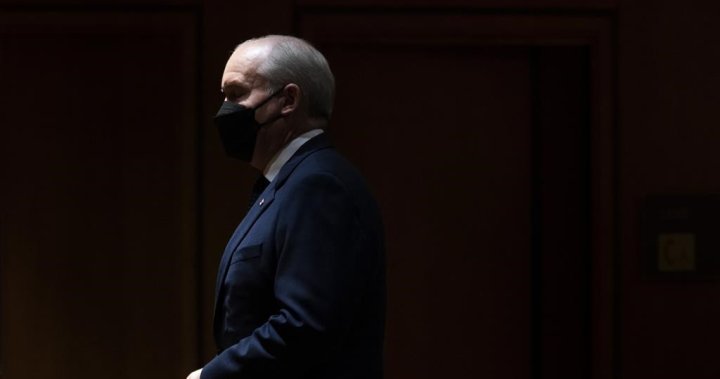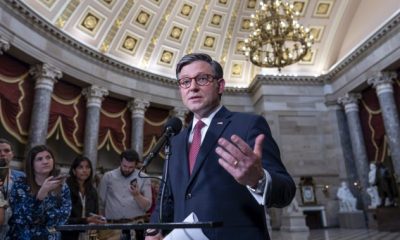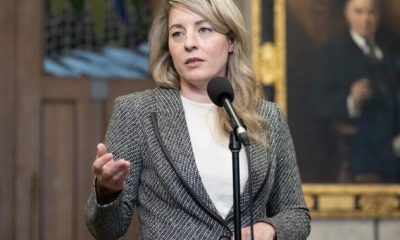General News
ANALYSIS: Erin O’Toole’s legacy will be defined by what comes after his political exit – National

Erin O’Toole first needed to convince the Conservative base that he was a fire-breathing, Big-C Conservative.

O’Toole then needed to strike a bargain with his MPs to go along with his plans — which deviated significantly from his leadership persona, dragging the party to the political centre — in exchange for winning back power.
When his plan did not produce a Conservative government in 2021, O’Toole found himself beset by internal bickering that exploded into a public challenge of his leadership by his own caucus.
In the end, he lost that challenge.
Read more:
Erin O’Toole, former Conservative leader, leaving politics: ‘Honour of a lifetime’
There are differing views on this strategy, including within Canada’s Conservative movement itself. The first stage worked — O’Toole won the party’s pandemic leadership against a shambolic Peter MacKay campaign.
The second stage failed to win back power after six years of Liberal rule. But as O’Toole prepares to leave federal politics, a final assessment of O’Toole’s strategy will largely depend on how his successor, Pierre Poilievre – the embodiment of a fire-breathing, Big-C Conservative – fares in the next election.
There might be a tendency to think that O’Toole’s plan was wrong, or the execution was off, or it amounted to a betrayal of not just his leadership promises but the party’s principles. That is the prevailing sentiment among a certain segment of Conservative MPs and activists.
Another opinion would be that while the direction was sound, politically, O’Toole attempted to move too fast with too tenuous a grasp over the party’s largely Western-based caucus.
O’Toole announced Friday morning that he would not seek re-election in Durham, the eastern Ontario seat he has held for the Conservatives since coming to Ottawa in a 2012 byelection.
As an MP and later as party leader, O’Toole was viewed in Ottawa as a thoughtful and approachable conservative voice on Parliament Hill — focusing his energy on veterans and later the foreign affairs file, often penning long blog posts or op-eds on thorny political issues, talking up his time in the military and about his wife, Rebecca and their two children.
“Canada is an incredible country and I have been fortunate to serve its people in the military and in Parliament,” O’Toole wrote in a public statement.
“I am a proud Conservative and had the unique privilege to lead our party amid a challenging time for our country. The Conservative Party is the party of Confederation and I know it will return to government offering the hope and ideas our country so desperately needs.”
Read more:
O’Toole calls for ‘balance’ as Conservative MPs plunge party into leadership race
Shortly after his election, O’Toole was named to Stephen Harper’s cabinet as minister for veterans’ affairs — an issue that O’Toole, who served in the Canadian Armed Forces before his legal and political careers, continued to champion as a MP after Harper’s defeat in 2015.
He surprised many observers with a strong third-place finish in the crowded 2017 leadership race that saw Andrew Scheer take the party’s helm, with Scheer naming O’Toole his foreign affairs critic.
Scheer ultimately resigned after a disappointing 2019 election night; a resignation helped along by an outside-the-castle coup led by Conservative activists and operatives — including some who would go on to support O’Toole. It would become a bit of a trend in Conservative leadership politics.
Unlike his first unsuccessful leadership bid, in 2020 O’Toole painted himself as a “true blue” Conservative — in contrast to his main rival, Peter MacKay, the last leader of the Progressive Conservative Party of Canada. O’Toole’s team painted MacKay as Liberal lite, despite MacKay helping to found the modern Conservative Party and serving in senior roles in every one of Harper’s cabinets.
MacKay’s campaign failed to mount a successful defence against the attack. And despite skepticism about O’Toole’s red-meat bona fides — he was seen as a moderate and media-friendly MP before the leadership — his gambit succeeded.
Read more:
Peter MacKay says he will not run in next federal election after losing CPC leadership race
But the lackluster leadership contest — overshadowed by the onset of the COVID-19 pandemic — failed to energize the Conservative Party, whose grassroots were faced with a choice between MacKay, O’Toole, and social conservative outsider candidates Leslyn Lewis and Derek Sloan.
And O’Toole’s win on the third and final ballot — thanks to Lewis’ supporters gravitating away from MacKay — didn’t give the Conservative leader a strong mandate to take the party where he felt it needed to go.
O’Toole very quickly began tacking to the political centre after assuming the leadership, as his team got busy trying to prepare the atrophied Conservative Party machinery for an election they felt would come sooner rather than later.
Consultants from outside the country were brought in to help the party with political data crunching and analysis — a crucial element to modern federal campaigns — as well as social media messaging.
O’Toole’s team attempted to sell a skeptical Conservative caucus that they had a path to regain power, and that it ran through the Greater Toronto Area — the seat-rich region that delivered Harper his majority in 2011, but that the Liberals had owned in 2015 and 2019.
The final straw for some MPs was O’Toole’s reversal of his position on the carbon tax. O’Toole had vowed to scrap the Liberals’ carbon pricing scheme during the leadership. When news broke that his team was considering a similar plan, O’Toole publicly denied the reporting.
Read more:
O’Toole acknowledges Conservative concern over his carbon pricing plan
A few weeks later, O’Toole proposed a somewhat convoluted environment plan that definitely looked like a carbon tax to his MPs and the party base.
“We have to have a serious climate change plan, there’s just no way around it,” an unnamed senior O’Toole source told the Toronto Star at the time. It was a matter of “when, not if” the party would embrace carbon pricing, the source said.
Just months shy of the Liberals’ election call, the grumblings from O’Toole’s caucus had turned into shouts. And the charges of “Liberal lite” — which O’Toole’s people used to attack MacKay — were being turned back on the Conservative leader.
Guns, germs and the 2021 election
Despite the backbiting, O’Toole and the Conservatives had a strong start to the 2021 federal election campaign — shifting the prevailing narrative from a potential Liberal majority to Justin Trudeau’s party being in trouble.
The Conservatives released a robust platform early in the election from the comfort of a custom-built television studio in Ottawa — part of the party’s plans to campaign amidst an ongoing COVID-19 pandemic.
It was a big spending platform — more than $100 billion over 10 years, more than half devoted to boosting health care funding for the provinces — that promised to balance the budget without cuts. A budget that would, in effect, balance itself.
The early platform release captured plenty of headlines, but it also gave a struggling Liberal party plenty of time to find O’Toole’s weaknesses. And when Trudeau’s team found one in the Conservatives’ position on gun laws, they fully exploited it.
The Conservative platform committed to reverse the Liberals 2020 ban on certain firearms, including the AR-15. After days of mid-campaign attacks from the Trudeau campaign — accusing O’Toole of cutting a “secret deal” with the Canadian gun lobby — O’Toole reversed his position.

Toward the end of the contest, O’Toole’s campaign stops were beset with questions about how many of his MPs had been vaccinated against COVID-19 — another point of tension within the Conservative party, which was fielding a number of vaccine-skeptical candidates. O’Toole had no answer because, a senior campaign member said afterwards, multiple candidates refused to disclose their vaccination status to Conservative HQ.
The questions came at a time when COVID concerns were resurgent, and at the worst possible time for O’Toole’s electoral chances. In the dying days of the campaign, senior sources started musing that holding Trudeau to another minority would count as a victory.
Despite the setbacks, the Conservatives won the popular vote — as they had in 2019 — but the Liberals won the most seats, paving the way for Trudeau’s third government and second minority. O’Toole immediately put his political fate in the Conservative caucus’ hands — encouraging them to adopt rules that would allow MPs to remove their own leader.
‘Two roads’ for Conservatives
While O’Toole and his team struggled to maintain control, a largely unforeseen crisis was motoring to Ottawa in the form of the “Freedom Convoy,” fuelled by COVID-related grievances and a desire to see Trudeau gone.
O’Toole attempted to walk a fine line between acknowledging the legitimate concerns from protesters, while not hitching his wagon to the movement. Poilievre, then O’Toole’s finance critic and most prominent MP, did not feel the need to strike that balance — repeatedly saying he was “proud” to support the protest.
Read more:
O’Toole to meet with trucker convoy in Ottawa, disavows ‘extremist elements’
The convoy’s arrival in Ottawa came as Conservative MPs publicly advocated to put O’Toole’s leadership to a vote. Despite the unprecedented political situation and against the backdrop of blaring horns, O’Toole’s team were confident they had the votes to hang on.
Two days before the vote, O’Toole publicly told MPs they had “two roads” ahead of them.
One path was “angry, negative and extreme … one that would see the party of Confederation become the NDP of the right.” The other?
“To recognize that conservatism is organic not static and that a winning message is one of inclusion, optimism, ideas and hope,” O’Toole wrote on Twitter.
A total of 73 MPs voted to oust O’Toole, with just 45 backing his continued leadership.
Determining O’Toole’s legacy
In some ways, the Conservatives now have what they thought they were voting for in the 2020 leadership campaign. Pierre Poilievre is vowing to scrap the Liberals’ carbon tax, defund the CBC, cap federal spending and balance the federal budget. He talks about defending “freedom of speech” against the “woke mob,” about the dangers of Davos and the World Economic Forum. He has long chats with Jordan Peterson.
Anybody waiting for Poilievre to pivot, as O’Toole did after securing the leadership, is still waiting. With Poilievre, one friend said, “What you see is what you get.”
What remains to be seen is whether Poilievre and his policies will be as appealing to Canadian voters as they were to the Conservative base — which grew significantly during through his leadership campaign and delivered him a first-ballot victory.
Poilievre and his team have some distinct advantages that O’Toole did not: a unified caucus, a strong mandate from the rank-and-file, and they will face a Liberal party and prime minister even longer-in-the-tooth than in 2021.
If he wins power in the next election — whenever it comes — there will be those in the Conservative movement who will view it as Canadians embracing an actual Conservative leader, and a repudiation of O’Toole’s project of conservativism with a carbon tax.
If he loses, the soul-searching will begin again to find the right balance to break through with Canadian voters. And O’Toole’s legacy as leader will be a little bit more complicated than they’d like to think.
Disclaimer: No copyright infringement intended. All rights and credits reserved to respective owner(s).

























